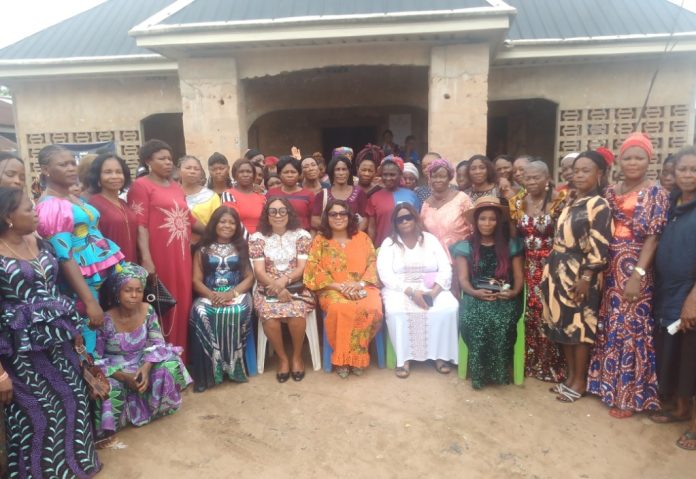Obikabia, Isiala Ngwa North, Abia State — In a stirring call to action, the Abia State Government has urged rural women to adopt sustainable agricultural practices and prioritize environmental conservation as part of efforts to tackle climate change and secure a brighter future for the state. This appeal was made during a sensitization event in celebration of the 2024 International Day for Rural Women, held on Tuesday in Obikabia, Isiala Ngwa North Local Government Area (LGA).
The theme of this year’s observance, “Rural Women Sustaining Nature for Our Collective Future: Building Climate Resilience, Conserving Biodiversity, and Caring for Land towards Gender Equality and Empowerment of Women and Girls,” aligns with the United Nations’ annual celebration on October 15. The theme underscores the critical role rural women play in environmental protection, food security, and climate resilience, encouraging communities to recognize and empower them.
Leading the charge at the sensitization event was Mrs. Chinwe Onyeukwu, the Special Assistant to the Governor on Women Affairs. She highlighted the importance of sustainable farming methods, stressing that rural women are at the forefront of agricultural activities and environmental stewardship. “Women are central to our efforts to combat climate change and deforestation,” Onyeukwu said. “Their deep-rooted knowledge of agriculture and conservation has been vital in preserving our ecosystem for generations. Now, it is time to combine that traditional knowledge with sustainable practices to protect our future.”
Policy Support for Rural Women
Onyeukwu reassured participants that the state government remains committed to supporting women through policies that promote equal opportunities and improve livelihoods. She cited the newly enacted Female Inheritance Law, which grants women the right to inherit landed property, as a crucial step in empowering women.
“Access to land is essential for sustainable agriculture,” Onyeukwu said. “We urge women to take full advantage of this opportunity to enhance their productivity and secure better economic outcomes for their families. This law is part of the government’s broader commitment to gender equality and sustainable development.”
She emphasized that rural women’s access to resources, education, and land ownership is fundamental not only to their personal empowerment but also to the successful management of natural resources, ensuring food security, and building climate resilience in Abia State.
Mobilizing Women for Climate Action
Also speaking at the event, Mrs. Chinwe Kanu-Ubah, the Special Assistant to the Governor on Women Mobilization, underscored the need for rural women to be proactive in combating climate change. She stressed that women, as primary caregivers and providers in most households, hold a pivotal role in climate action and sustainable agriculture.
“Women must not only be included in climate discussions but empowered with the right tools and skills to contribute meaningfully,” Kanu-Ubah said. “Our future depends on sustainable agriculture, and women—especially those in rural areas—must be equipped to lead this change.”
She encouraged women to embrace lifelong learning and skill acquisition to remain relevant and productive in today’s world. Kanu-Ubah also advocated for healthy living practices, urging women to consume more natural foods for their wellbeing.
“When women take care of their health, they are better equipped to care for their families and manage their businesses effectively,” she added.
Acknowledging Women’s Contributions
The event provided a platform for dialogue between government officials and rural women. Mrs. Nkechi Chibueze, the Women Leader of the Labour Party in Isiala Ngwa North LGA, expressed gratitude to the Abia State Government for recognizing the efforts of rural women and for creating opportunities for them to be heard.
“This program shows that the government values us and the work we do,” Chibueze remarked. “It has given us the confidence to do more, knowing that our contributions are being acknowledged.”
Farmers and traders in attendance appreciated the practical insights provided during the sensitization. Many of them noted that the session gave them new strategies to improve their farming practices and adapt to changing environmental conditions.
“The knowledge I’ve gained today will help me expand my business sustainably,” said one participant, a farmer from the community. “It’s reassuring to know that the government is supporting us.”
The sensitization program was not limited to Isiala Ngwa North LGA; similar events were held in other rural communities, including Umuahia North LGA, further extending the government’s outreach to women across the state.
A Commitment to Sustainability and Inclusion
The Abia State Government reaffirmed its commitment to promoting sustainable agriculture and environmental conservation while empowering rural women to play a central role in the state’s development. Officials stressed that achieving gender equality and building climate resilience requires the full participation of women in agricultural and environmental initiatives.
“This is not just a government initiative but a collective effort,” Onyeukwu concluded. “By working together and equipping our rural women with the right resources, we are ensuring a sustainable future for all.”
The 2024 International Day for Rural Women celebration in Abia State was a reminder that empowering women is essential for building resilient communities. As the state government continues to roll out inclusive policies and programs, rural women are encouraged to embrace sustainable practices, conserve the environment, and take ownership of their role in shaping a better future.
With events like these and the support of the government, Abia State is setting the stage for rural women to thrive, not only as farmers and caregivers but as leaders in the fight against climate change and environmental degradation.


